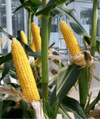Abstract
This publication describes studies conducted to determine best pot size for optimizing greenhouse corn production. We suggest a 2.2-gallon container without large drainage holes extending up the side of the pot. This represents an update of our previous recommendation of a smaller pot, after observing instability in row planting configurations. Photos are included of corn in various size pots.
This document is one entry in a series of questions and answers originally posted to the Purdue University Department of Horticulture & Landscape Architecture’s Plant Growth Facility Web site (http://www.hort.purdue.edu/hort/facilities/greenhouse/CornMethod.shtml) regarding best practices for corn plant growth in a greenhouse. Controlled studies were conducted with the goals of optimizing growth and yield; developing standardized methodology using readily available commercial materials; and providing recommendations for both high-tech and low-tech facilities. Digital images showing treatment differences are included, as well as statistical analysis of data. A summary of recommendations; materials and methods description; and a reference list are available in separate documents.
Keywords
corn, maize, Zea mays, growing methods, greenhouse methods, greenhouse protocols, greenhouse best practices, Purdue methods, calcined clay, porous ceramic, Turface, tassel storage, pollen storage, automated irrigation, drip irrigation, growth regulator
Date of this Version
4-2012
Recommended Citation
Gambrel, Derek; Eddy, Robert; and Hahn, Daniel T., "Optimizing Greenhouse Corn Production: What Is the Best Pot Size?" (2012). Purdue Methods for Corn Growth. Paper 16.
https://docs.lib.purdue.edu/pmcg/16



Comments
Purdue Methods: Optimizing Greenhouse Corn Production--This document is based on materials originally posted to the Purdue University HLA Department Plant Growth Facility web site: http://www.hort.purdue.edu/hort/facilities/greenhouse/CornMethod.shtml (Original Page Archived by WebCite® at http://www.webcitation.org/5oLVAd2bc)